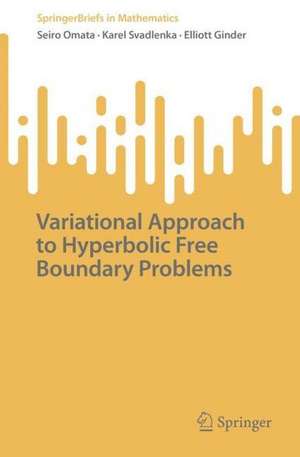Variational Approach to Hyperbolic Free Boundary Problems: SpringerBriefs in Mathematics
Autor Seiro Omata, Karel Svadlenka, Elliott Ginderen Limba Engleză Paperback – 29 noi 2022
Din seria SpringerBriefs in Mathematics
-
 Preț: 378.46 lei
Preț: 378.46 lei -
 Preț: 380.84 lei
Preț: 380.84 lei -
 Preț: 380.29 lei
Preț: 380.29 lei -
 Preț: 383.93 lei
Preț: 383.93 lei -
 Preț: 350.11 lei
Preț: 350.11 lei -
 Preț: 352.28 lei
Preț: 352.28 lei -
 Preț: 351.57 lei
Preț: 351.57 lei -
 Preț: 378.92 lei
Preț: 378.92 lei -
 Preț: 341.60 lei
Preț: 341.60 lei -
 Preț: 452.06 lei
Preț: 452.06 lei -
 Preț: 379.48 lei
Preț: 379.48 lei -
 Preț: 446.65 lei
Preț: 446.65 lei -
 Preț: 351.57 lei
Preț: 351.57 lei - 15%
 Preț: 463.68 lei
Preț: 463.68 lei -
 Preț: 377.95 lei
Preț: 377.95 lei -
 Preț: 378.12 lei
Preț: 378.12 lei -
 Preț: 352.28 lei
Preț: 352.28 lei -
 Preț: 379.68 lei
Preț: 379.68 lei -
 Preț: 376.80 lei
Preț: 376.80 lei -
 Preț: 351.90 lei
Preț: 351.90 lei -
 Preț: 380.07 lei
Preț: 380.07 lei -
 Preț: 352.28 lei
Preț: 352.28 lei -
 Preț: 350.81 lei
Preț: 350.81 lei -
 Preț: 343.72 lei
Preț: 343.72 lei -
 Preț: 349.41 lei
Preț: 349.41 lei - 15%
 Preț: 464.18 lei
Preț: 464.18 lei -
 Preț: 351.90 lei
Preț: 351.90 lei - 15%
 Preț: 464.32 lei
Preț: 464.32 lei -
 Preț: 381.00 lei
Preț: 381.00 lei -
 Preț: 344.47 lei
Preț: 344.47 lei - 15%
 Preț: 462.19 lei
Preț: 462.19 lei -
 Preț: 377.18 lei
Preț: 377.18 lei -
 Preț: 378.34 lei
Preț: 378.34 lei -
 Preț: 345.45 lei
Preț: 345.45 lei -
 Preț: 355.76 lei
Preț: 355.76 lei - 20%
 Preț: 352.85 lei
Preț: 352.85 lei -
 Preț: 453.15 lei
Preț: 453.15 lei -
 Preț: 380.45 lei
Preț: 380.45 lei -
 Preț: 377.95 lei
Preț: 377.95 lei -
 Preț: 343.00 lei
Preț: 343.00 lei -
 Preț: 562.34 lei
Preț: 562.34 lei - 15%
 Preț: 461.73 lei
Preț: 461.73 lei -
 Preț: 379.68 lei
Preț: 379.68 lei -
 Preț: 379.68 lei
Preț: 379.68 lei -
 Preț: 411.36 lei
Preț: 411.36 lei -
 Preț: 343.72 lei
Preț: 343.72 lei -
 Preț: 350.11 lei
Preț: 350.11 lei -
 Preț: 448.21 lei
Preț: 448.21 lei -
 Preț: 378.92 lei
Preț: 378.92 lei -
 Preț: 344.86 lei
Preț: 344.86 lei
Preț: 377.82 lei
Nou
Puncte Express: 567
Preț estimativ în valută:
72.30€ • 75.06$ • 60.29£
72.30€ • 75.06$ • 60.29£
Carte tipărită la comandă
Livrare economică 25 martie-08 aprilie
Preluare comenzi: 021 569.72.76
Specificații
ISBN-13: 9789811967306
ISBN-10: 981196730X
Pagini: 94
Ilustrații: IX, 94 p. 1 illus.
Dimensiuni: 155 x 235 mm
Greutate: 0.17 kg
Ediția:1st ed. 2022
Editura: Springer Nature Singapore
Colecția Springer
Seria SpringerBriefs in Mathematics
Locul publicării:Singapore, Singapore
ISBN-10: 981196730X
Pagini: 94
Ilustrații: IX, 94 p. 1 illus.
Dimensiuni: 155 x 235 mm
Greutate: 0.17 kg
Ediția:1st ed. 2022
Editura: Springer Nature Singapore
Colecția Springer
Seria SpringerBriefs in Mathematics
Locul publicării:Singapore, Singapore
Cuprins
Chapter 1. Introduction.- Chapter 2.Physical motivation.- Chapter 3.Discrete Morse flow.- Chapter 4. Discrete Morse flow with free boundary.- Chapter 5.Energy-preserving discrete Morse flow.- Chapter 6.Numerical examples and applications.
Notă biografică
Seiro Omata was born in 1957 in Tokyo and received his Master and PhD degrees from Keio University. Since 1994 he has been working at Kanazawa University, becoming Full Professor in 2004. His research focuses on nonlinear evolutionary PDEs, including variational and free boundary problems, numerical analysis and applied analysis spanning numerous topics from fluid dynamics to mathematical finance. He devoted himself to the development of mathematics through the Mathematical Society of Japan, being invited as plenary speaker at its annual meeting in 2014 and serving as the chair of annual meeting in 2019.
Karel Svadlenka received his PhD in mathematics from Kanazawa University, Japan and from Charles University in Prague, Czech Republic, and has been an Associate Professor at the Department of Mathematics, Graduate School of Science, Kyoto University, Japan since 2014. His research interests include calculus variations, nonlinear partial differential equations, numerical analysis, and mathematical modeling.
Elliott Ginder is a Professor at Meiji University in the School of Interdisciplinary Mathematical Sciences. An Aries, he enjoys applied mathematics, especially topics involving interfacial motions, and the calculus of variations.
Textul de pe ultima copertă
This volume is devoted to the study of hyperbolic free boundary problems possessing variational structure. Such problems can be used to model, among others, oscillatory motion of a droplet on a surface or bouncing of an elastic body against a rigid obstacle. In the case of the droplet, for example, the membrane surrounding the fluid in general forms a positive contact angle with the obstacle, and therefore the second derivative is only a measure at the contact free boundary set. We will show how to derive the mathematical problem for a few physical systems starting from the action functional, discuss the mathematical theory, and introduce methods for its numerical solution. The mathematical theory and numerical methods depart from the classical approaches in that they are based on semi-discretization in time, which facilitates the application of the modern theory of calculus of variations.
Caracteristici
Points out a new direction in the analysis of hyperbolic free boundary problems with variational structure Treats a range of increasingly difficult problems to gradually introduce a variational approach to hyperbolic problems Contains several examples of numerical schemes for practical problems
